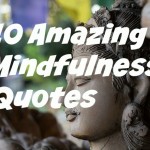
What does it mean to meditate on something?
This is a phrase people throw around a lot. Have a problem? “Go meditate on that.”
Hit a roadblock in deciding what job to take, or where to live? “I’ll go meditate on that.”
But what does this mean?
Meditating on something is not simply thinking about it. It is not journaling, or dialoging, creating charts and graphs, nor is it working with a therapist.
All of these can be excellent tools for growth, understanding, and support, but they are not meditation.
The Limits of Thought
Mindfulness meditation is a tool of awareness. It encourages us to step back and witness all input in a nonjudgmental way.
In every moment, we can be aware of sight, smell, touch, taste, sound, but also thought, emotion, and intuition.
Throughout our day, the relative weights we give to each of those sources of input varies.
When eating dinner we receive far more input from taste than we do when we’re watching TV or playing tennis. When working on a crossword puzzle, my taste buds are not going to add anything to help me come up with a 6-letter answer for “lummox.”
Thought is an incredibly powerful tool, and we wouldn’t be here without it. It is easily argued that the human mind is the pinnacle achievement of biological evolution.
Without thought, we wouldn’t have indoor plumbing, we wouldn’t have walked on the moon, and we wouldn’t have any semblance of modern-day society.
But thought has its limits. It is one-dimensional.
Albert Einstein once quipped, “It would be possible to describe everything scientifically, but it would make no sense; it would be without meaning, as if you described a Beethoven symphony as a variation of wave pressure.”
Thinking Beyond The Mind
To consider a sunset beautiful, you do not need to think about the reasons for its beauty. It simply is.
You can calculate the angle of the sun in the sky, enumerate the specific colors in the sky, or scientifically describe the nature of photons reflecting and refracting from particles of air pollution, but none of that is required to appreciate the beauty of the experience.
Instead, the fullness of the sunset is experienced through the senses.
Meditation helps restore a balance between thought and other sources of input, empowering us to live life beyond the one-dimensional analytic mind and instead from a place of awareness.
To use meditation as a tool for gaining insight into ourselves or a situation in life means to embrace all the senses.
We must let go of the idea that the answer will come from the mind, and consider that the answer will become clear when we include the other sources of input available to us.
Mindfulness Includes Much More Than Your Mind
“I feel stressed, overwhelmed,” a client shares with me. “I have so much to do.”
To think about this problem would be for us to itemize all that she has to do, triage what needs to get done by when, and come up with a plan to clear her slate.
Alternatively, a therapist might help her unpack the layers of childhood trauma and the familial, peer, and cultural pressures that have brought her to this point.
Instead, I invited her to bring her awareness to the situation, including the senses beyond thought. I asked her where in her body she felt this overwhelm.
She paused and closed her eyes, and responded that her chest felt tight and uneasy. Letting the feeling speak for itself, why is it overwhelmed? What would it mean to her if she didn’t get the items on her to-do list done?
Right after I posed these questions to her, a burst of sadness came forth and she started to sob, replying that she would feel like a failure.
An Exercise In Being Aware
That conclusion was not arrived at by thinking about the situation, but rather, including other pieces of her awareness. It wasn’t an analytic dissection of her life, but rather, an exercise in being aware of all the input she was receiving at the moment.
With the exception of thought, all sources of input that inform our awareness come from our bodies. Yet it has become standard in our culture to give the most weight to our thoughts.
Meditation is a great tool for reawakening our connection with our bodies and all the information they provide us. Once we have reestablished this connection, we are empowered to use all that information for greater insight.
Meditate On It
If you are struggling with a decision or are confused by a situation, it may be helpful to use your mind to help sort things out. And yet it may prove easier and more effective to meditate on the obstacle in your path.
Reconnect with all your senses through meditation and see what the consensus is in your awareness. There is a lot to be gained by giving time, space, and energy to all your body’s wisdom.
Meditate on that.



Practicing mindfulness is helping me overcom PTSD from combat induced trauma. And, in dealing with life in general.
Heitened awarenness and spontaneous connecting with nonlocal consciousness, the consciousness of all things in the universe is made possible through practicing mindfulness.
Dear Richard, Thanks so much for sharing your experience. I think you’re spot on and I resonate with your observations about heightened and nonlocal awareness. You might also be aware of the work of Dr. Richard Miller, the founder of iRest, who also works with veterans suffering from PTSD. Last year I interviewed Dr. Miller. He’s a beautiful man and you might enjoy the discussion. https://aboutmeditation.com/podcast/healing-emotional-trauma-irest-meditation/
Meditation is something that changed my life. Life is full of good days and bad days, whether today is good or bad I am grateful for each and every day. By being able to silence your mind, you are able to experience life itself. You know how to take care of the things that are happening inside you, and you know how to take care of the things that happen around you.
A really insightful post on mindfulness. Thanks for sharing, David!